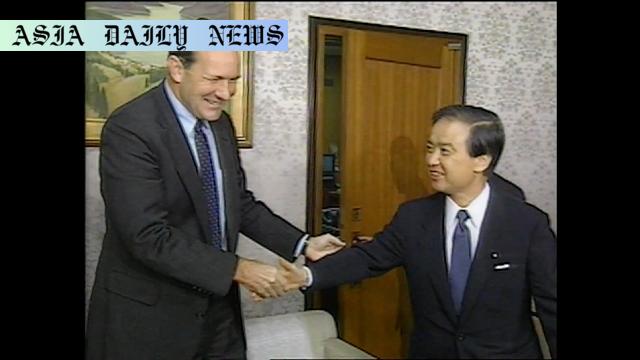Michael Armacost urged Japan’s Self-Defense Forces’ dispatch during Gulf War, marking diplomatic influence during his ambassadorial role.
Michael Armacost, former US Ambassador to Japan, passed away at 87.
He was pivotal in pushing for Japan’s Self-Defense Force’s dispatch in the Gulf War.
Regarded as a proponent of economic deregulation, including Japan’s rice market opening.
Served as Brookings Institution president and Stanford fellow after retiring.

Michael Armacost’s Distinguished Beginnings
Michael Armacost, a renowned US diplomat, was born in 1937 in Ohio. His journey through academia commenced with remarkable dedication when he graduated from Columbia University with a doctorate in public law and government in 1965. His entry into the State Department soon followed, where he began carving a niche with his profound expertise and insight in foreign policy.
Early in his diplomatic career, he made significant contributions as a special assistant to the US ambassador to Japan between 1972 and 1974. This period marked the beginning of his long-standing association with Japan, which would later define much of his professional persona. Over time, Armacost’s unparalleled understanding and experience within Japan-US relations earned him acknowledgment as a leading figure in diplomacy.
Rise to Prominence as Ambassador to Japan
Appointed as the US Ambassador to Japan in 1989 under President George H.W. Bush, Armacost gained international recognition for his stringent yet visionary approaches. Dubbed “Mr. Gaiatsu,” or “Mr. Foreign Pressure,” he championed Japan’s dispatch of Self-Defense Forces during the Gulf War in 1991. His philosophy revolved around urging Japan to adopt more proactive roles on the global stage, particularly aligning with modern peacekeeping initiatives—a notion that triggered considerable debate in Japan at the time.
Beyond military affairs, Armacost’s tenure was also notable for his calls for deregulation within the Japanese economy. Notably, he urged the opening of Japan’s highly-protected rice market, a move resonating with the broader agenda of global economic liberalization. His efforts to create a balance between national interest and international cooperation earned him respect and criticism in equal measure, yet his role as an agent of change is undeniable.
Life After Diplomacy: Leadership in Think Tanks
After retiring from the ambassadorship in 1993, Armacost pursued a distinguished career beyond traditional diplomacy. He spearheaded the prestigious Brookings Institution as its president, directing pivotal research in global policy issues. His leadership elevated the institution’s research output and public influence, making it a cornerstone for policy discussions in Washington.
Following his tenure at Brookings, Armacost served as a distinguished fellow at the Walter H. Shorenstein Asia-Pacific Research Center at Stanford University. Here, he extended his legacy by mentoring upcoming leaders and contributing to a deeper understanding of US-Asia relations. His reflections and writings during this period continue to inspire policymakers and students alike.
A Lasting Legacy
Michael Armacost passed away at his home in San Francisco at the age of 87, leaving behind an enduring legacy. Known for precision, adaptability, and visionary thinking in the realm of international policy, he remains a figure of immense respect among his peers and the global community. As “Mr. Gaiatsu,” he championed a shift in Japan’s post-war identity while advocating economic openness—both ideals that continue to influence discussions decades later.
Beyond his professional achievements, Armacost’s role as a mentor and thought leader remains equally notable. His contributions to think tanks such as Brookings and Stanford’s Shorenstein Center reflect a lifetime commitment to advancing the understanding and dialogue between nations. The principles and practices he advocated during his lifetime still serve as guiding lights for ongoing diplomatic and economic collaboration worldwide.



Commentary
Michael Armacost: A Life Steeped in Diplomacy
Remembering Michael Armacost compels us to appreciate an era that combined steadfast discipline with unwavering diplomacy. His moniker, “Mr. Gaiatsu,” epitomizes his boldness in pushing boundaries, especially in roles where pragmatism and persuasion were indispensable. His advocacy for Japan dispatching its Self-Defense Forces during the Gulf War was not merely a policy suggestion—it was a reflection of his belief in collaboration addressing global challenges.
What stands out in Armacost’s career is his keen understanding of the nuanced dynamics between national priorities and international obligations. From advocating liberalization in Japan’s economy to opening the rice market, Armacost wasn’t deterred by opposition. Instead, he leveraged these challenges to emphasize the importance of unity in a rapidly globalizing world. Such policies, though polarizing at times, reflected his foresight in ensuring cooperation extended beyond political rhetoric.
Contributions Beyond Diplomacy
Armacost’s influence went beyond his ambassadorial roles. His leadership at the Brookings Institution and contributions as a Stanford fellow underscore his dedication to fostering intellectual growth and policy research. Tackling global issues with determination, his commitment to shedding light on crucial socio-economic dilemmas mirrored the very essence of public service.
His legacy underscores that leadership is not confined to positions, but rather extends through the ability to inspire and challenge the status quo. Over the decades, Armacost demonstrated that balancing statesmanship with effective policy implementation can forge long-lasting partnerships on the global stage.
A Remembered Trailblazer
Armacost’s passing prompts profound reflection on the importance of diplomacy as an enduring pillar of global peace and prosperity. In a world increasingly defined by division, Armacost’s willingness to confront challenges with candor and vigor serves as inspiration for the next generation of diplomats and leaders. It’s a poignant reminder that the quest for harmony demands individuals with foresight and resilience to bridge divides.
His story will be remembered not just as history, but as a framework for effective dialogue and cooperation in the ever-evolving tapestry of international relations. Michael Armacost’s life serves as an exemplar of dedication, foresight, and the ability to leave an indelible mark on the global community.